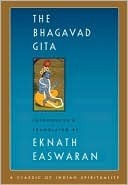More on this book
Community
Kindle Notes & Highlights
Of these three, sattva, untainted, luminous, free from sorrow, binds by means of attachment to knowledge and joy, Arjuna.
Rajas is marked by passion born of craving and attachment; it binds the embodied Self...
This highlight has been truncated due to consecutive passage length restrictions.
Tamas, ignorance-born, deludes all embodied beings; it binds them, Arjuna, by means of dull...
This highlight has been truncated due to consecutive passage length restrictions.
When a man sees clearly that there is no doer besides the gunas and knows what exists beyond them, he can enter my state of being.
ARJUNA SAID: How can I recognize the man who has gone beyond the three gunas? What has he done to go beyond them? How does he act? THE BLESSED LORD SAID: Whatever quality arises— light, activity, delusion— he neither dislikes its presence nor desires it when it is not there.
Cut down this deep-rooted tree with the sharp-edged ax of detachment; then search for that primal Person from whom the whole universe flows.
but men without self-control, however they strive, do not see him.
They say that life is an accident caused by sexual desire, that the universe has no moral order, no truth, no God. Clinging to this stupid belief, drawn into cruelty and malice, they become lost souls and, at last, enemies of the whole world.
This is the soul-destroying threefold entrance to hell: desire, anger, and greed. Every man should avoid them.
Foods that the sattvic are drawn to promote vitality, health, pleasure, strength, and long life, and are fresh, firm, succulent, and tasty.
Foods that please the rajasic— bitter or salty or sour, hot or harsh or pungent— cause pain, disease, and discomfort.
The preferred foods of the tamasic are stale, overcooked, tasteless, contaminated, impure, ...
This highlight has been truncated due to consecutive passage length restrictions.
Ôm Tat Sat: these words stand for the liberated mind by which priests, scriptures, and rituals were appointed in ancient times. Therefore, the word Ôm is always chanted, by those who expound the scriptures, to begin an act of worship, control, or charity. Tat—which means “That,” “the Absolute”— is chanted by seekers of freedom whenever they perform right actions with no concern for results.
To give up desire-bound actions is what is meant by renouncing; to give up the results of all actions is what the wise call to relinquish.
When a man relinquishes action because it is hard or painful— that relinquishment is rajasic, and cannot guide him toward freedom.
For those who cling to it, action has three results when they die— desired, undesired, and mixed; but for those who renounce, it has none.
A man who is free from the I-sense and is pure, even if he kills these warriors, does not kill, nor is he bound by his actions.
The unswerving will that controls the functions of mind, breath, senses by the practice of meditation— this kind of will is sattvic.
It is better to do your own duty badly than to perfectly do another’s; when you do your duty, you are naturally free from sin.
Vinashaya paradharmo. Adopting someone else's dharma leads to destruction. Think of what happened when Ashwathama, son of Guru Drona, adopted a Kshatriya dharma instead of Brahmin dharma.
all actions are enveloped by flaws as fire is enveloped by smoke.
With a purified understanding, fully mastering himself, relinquishing all sense-objects, released from aversion and craving, solitary, eating lightly, controlling speech, mind, and body, absorbed in deep meditation at all times, calm, impartial, free from the “I” and “mine,” from aggression, arrogance, greed, desire, and anger, he is fit for the state of absolute freedom.
And even if, clinging to the I-sense, you say that you will not fight, your intention will be in vain: Nature will compel you to act. The thing that, in your delusion, you wish not to do, you will do, even against your will, since your own karma binds you.
(The great Zen Master Yang-shan said, “In my shop I handle all kinds of merchandise. If someone comes looking for rat shit, I’ll sell him rat shit. If someone comes looking for gold, I’ll sell him pure gold.”)
The author of the Mahabharata has not established the necessity of physical warfare; on the contrary, he has proved its futility. He has made the victors shed tears of sorrow and repentance, and has left them nothing but a legacy of miseries.
Man is not at peace with himself till he has become like God. The endeavor to reach this state is the supreme, the only, ambition worth having.
That matchless remedy is renunciation of the fruits of action.
Thus the devotion required by the Gita is no softhearted effusiveness. It certainly is not blind faith. The devotion of the Gita has the least to do with externals. A devotee may use, if he likes, rosaries, forehead marks, make offerings, but these things are no test of his devotion. He is a true devotee who is jealous of no one, who is a fount of mercy, who is without egotism, who is selfless, who treats alike cold and heat, happiness and misery, who is always forgiving, who is always contented, whose resolutions are firm, who has dedicated mind and soul to God, who causes no dread, who is
...more


